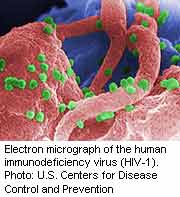
THURSDAY, July 14 (HealthDay News) — Researchers report that they’ve gained insight into the workings of the immune system’s response to HIV, the AIDS virus, in certain people, potentially providing a boost as scientists work toward a vaccine.
The findings won’t have an immediate big impact on either vaccine research or HIV treatment. However, they do reveal how soldiers of the immune system known as antibodies use special powers to combat the virus in some patients, said study co-author Dr. Michel C. Nussenzweig, a professor of immunology at The Rockefeller University in New York City.
Ultimately, he said, scientists could develop a vaccine that teaches people’s bodies how to make the antibodies. “You’d try to make them do it themselves,” he said, instead of pumping antibodies into the body.
Since the late 1990s, AIDS has largely become a treatable, chronic disease. But it can still be deadly, and many scientists think they’re years away from developing a vaccine to prevent people from becoming infected in the first place.
In the new study, published online July 14 in Science, researchers focused on antibodies that are produced only in certain patients with HIV. They work by preventing the virus from picking the locks in cells that are supposed to keep germs out.
The problem is that the antibodies don’t help cells that have already been infected, Nussenzweig said. And the antibodies only appear about two to three years after someone has been infected with the virus, he said. It’s not clear how much the antibodies help those people.
Nussenzweig and colleagues were able to clone the antibodies from four patients. “It’s possible that if you were to have enough of these things, there might even be a therapy” for people with the virus, he said. In other words, the antibodies could become part of a drug.
However, the antibodies don’t live long, meaning patients would have to undergo repeated and regular treatments if they wanted the protection they may be able to provide, he said. For now, he said, the research seems more likely to help the development of a vaccine.
U.S. National Institutes of Health vaccine researcher Dr. John Mascola said the findings extend “prior work to show that the human immune system can make antibodies that target vulnerable regions of HIV.”
Dr. Jonathan D. Fuchs, director of Vaccine Studies at the San Francisco Department of Public Health, said the findings represent an “important advance” because they help define the types of antibodies that vaccines need to elicit in the body.
More information
For more about HIV/AIDS, visit the U.S. National Library of Medicine.

